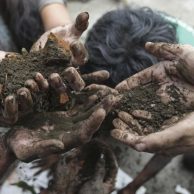
Photo Credit: Aaron Favila – AP, and The Daily Camera.
Our Soil Products for 2024 include:
Here are descriptions of many of the soil products we’ll have available at our store (sorry, we are not able to make deliveries). All of these are sold pre-packaged, and we bag many of them ourselves in refundable, reusable plastic bags. Our Compost Tea is sold in refundable, reusable 1-gallon jugs, or you can bring your own.
We currently do have straw in (not organic).
COMPOSTS
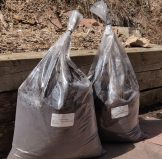
A1 Compost
A1 Eco-Gro: We nearly always have this premier compost in stock. A1 Eco-Gro is a Class I compost made from leaves, grass, chipped branches, and beer wastes. It contains a healthy population of microorganisms and diverse nutrients. It is very stable and will not burn or steal nitrogen. Fine-textured, low in salts, with some woody particles. Use in vegetable and flower gardens, lawns, trees, shrubs. The pH is 8.3; the
NPK 1-1-1.
EKO Compost: Made locally from forest and recycled wood products composted with egg-farm poultry manure. Use in vegetable and flower gardens, lawns, trees, shrubs. Improves soil’s physical, chemical, and biological health.
EKO Lawn Topdressing: a finer textured sifting from Eko Compost, ideal to topdress lawns following aeration and fertilizing; gets food and water-holding capacity to roots; great on perennial beds, too.
Organic Mushroom Compost: from a local organic mushroom farm. Premium food for soil life and wonderful in vegetable gardens, helps to loosen heavy soils and improve aeration and porosity. Limited quantities.
FERTILIZERS
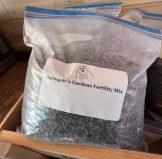 Harlequin’s Gardens Fertility Mix: Harlequin’s blend of certified organic fertilizer, humate, rock minerals, dry molasses, land: sourced coral calcium and mycorrhizae. Great for veggie gardens and all plants. Increases root mass, top growth, soil life, and productivity naturally. This is not just a fertilizer. The combination of ingredients and mycorrhizae act synergistically to support soil fertility.
Harlequin’s Gardens Fertility Mix: Harlequin’s blend of certified organic fertilizer, humate, rock minerals, dry molasses, land: sourced coral calcium and mycorrhizae. Great for veggie gardens and all plants. Increases root mass, top growth, soil life, and productivity naturally. This is not just a fertilizer. The combination of ingredients and mycorrhizae act synergistically to support soil fertility.
Yum Yum Mix: 2-2-2 Vegan/Organic fertilizer for alkaline, nutrient-poor Western soils, feeds plants and soil microbes. Made from alfalfa, cottonseed meal, kelp meal, rock dust, green sand, humate. Great for native plants, Xeriscapes. Available in large and small bags.
Richlawn 5-3-2 organic: made in Platteville, CO from poultry manure and wood wastes. Excellent for shrubs and trees and is recommended for raspberries and other small fruits. Also economical and effective for fertilizing lawns.
Alpha One Fertilizer: locally made 7-2-2. An alfalfa-based product with a high organic matter content, very high humic acid value, low pH for Colorado alkaline soils, and is non-burning. It also contains blood meal, cottonseed meal and bone meal. Excellent for vegetable gardens and lawns. 20# and 40# bags.
Age-Old Liquid & Granular fertilizers: For foliar sprays and soil application. GROW formula – great, smell-free choice for houseplants, seedlings, container gardens; BLOOM formula – supports plants ready to bloom and fruit; FRUIT FINISH – perfect at fruiting phase for berries, tomatoes, peppers, eggplants, squashes, cukes and zukes.
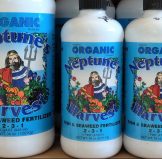 Neptune’s Harvest Organic Fertilizers: We carry several of these excellent liquid fertilizers derived from the mineral-rich North Atlantic Ocean, including Neptune’s Fish & Seaweed Blend, Neptune’s Seaweed Supplement, Neptune’s Tomato & Veg Formula.
Neptune’s Harvest Organic Fertilizers: We carry several of these excellent liquid fertilizers derived from the mineral-rich North Atlantic Ocean, including Neptune’s Fish & Seaweed Blend, Neptune’s Seaweed Supplement, Neptune’s Tomato & Veg Formula.
Fish Bonemeal – A natural source of phosphorus which is responsible for root development, fruiting and flower production in plants.
Earthworm Castings – Worm castings are soil or compost that had passed through an earthworm. What comes out contains 5x more nitrogen, 2x more calcium, 7x more phosphorus and potassium and many minerals and beneficial microorganisms all in water-soluble and plant-available forms. Worm “manure” will not burn and is safe for all plants, including houseplants. Worm castings support growth, root development, and disease resistance.
Rose Fertilizer: Down to Earth Rose and Flower Mix is our substitute for Mile Hi Rose Feed, and it looks good: OMRI Certified: Fish Bone Meal, Langbeinite minerals, Blood Meal, Seabird Guano, Rock Phosphate, Humate, Kelp.
Corn Gluten – a truly safe Weed & Feed; keeps weed seeds from growing, fertilizes with 9% Nitrogen. Lasts 6 months, Apply in March/April and again Sept/Oct for good weed suppression. Perfect for lawns.
SOIL-BIOLOGY BOOSTERS
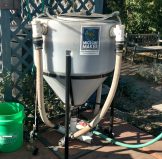 Compost Tea: In our Vortex brewer, we make compost tea with a biodynamic compost, a mineral concentrate, kelp extract, molasses, trace minerals, etc. Compost tea increases the beneficial micro-organisms in your soil, which can bring more nutrients and water to your plants and make them stronger and better able to cope with stress. It can be used full-strength as a mild organic fertilizer, or it can be diluted in water up to 3 times as a soil inoculant. It can also be used to inoculate compost piles to make materials break down faster. Available when temperatures are frost free. Bring your own jugs, or use ours for a $1 deposit (refundable upon return).
Compost Tea: In our Vortex brewer, we make compost tea with a biodynamic compost, a mineral concentrate, kelp extract, molasses, trace minerals, etc. Compost tea increases the beneficial micro-organisms in your soil, which can bring more nutrients and water to your plants and make them stronger and better able to cope with stress. It can be used full-strength as a mild organic fertilizer, or it can be diluted in water up to 3 times as a soil inoculant. It can also be used to inoculate compost piles to make materials break down faster. Available when temperatures are frost free. Bring your own jugs, or use ours for a $1 deposit (refundable upon return).
Humate
A natural trace mineral, carbon, and humic acid soil conditioner. It is not a fertilizer, but it has a significant effect on fertility by feeding soil microorganisms that make nutrients in the soil available to plants.
Humic Acid
3% humic acid derived from Leonardite. A natural liquid product with the same benefits as Humate – soil conditioning and feeding soil microorganisms that make nutrients in the soil available to plants. It is applied as a soil drench to established beds where granular materials can’t be dug in.
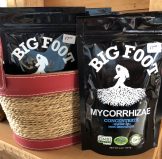 Big Foot Mycorrhizae
Big Foot Mycorrhizae
Water soluble symbiotic fungus, combining four species of mycorrhizae with biochar, worm castings, seaweed, and rock minerals to provide a strong population of plant allies to bring water and nutrients.
Endo Mycorrhizae
Water soluble symbiotic fungus, inoculate roots to bring water and nutrients. Easy to use and very effective. Good for shrubs, trees, all plants (even cacti!); dissolve in water, wet roots.
Myke Vegetable & Herb
Enhances growth, development, and production; dust the granules on wet roots or sprinkle in seed furrow to improve germination and growth.
POTTING SOILS
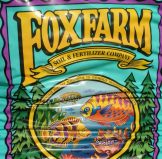 Fort Vee: Compost based, peat, rock dust, blood meal, kelp, bone meal, gypsum, vermiculite, biodynamic preps; Proven locally at Kilt Farm for seed germination and transplanting of seedlings and potting up house plants. Bag 20 qt (18 lb.)
Fort Vee: Compost based, peat, rock dust, blood meal, kelp, bone meal, gypsum, vermiculite, biodynamic preps; Proven locally at Kilt Farm for seed germination and transplanting of seedlings and potting up house plants. Bag 20 qt (18 lb.)
Ocean Forest: FoxFarm’s top grade with sphagnum peat, kelp meal, bat guano, fish emulsion, crab and shrimp meal, nutrient rich, performs well for seedlings and gardening in containers of all sizes. Bag 1.5 cf
Coco Loco: FoxFarm potting soil uses Coconut fiber (coir) instead of sphagnum peat, perlite, worm castings, composted forest products, sandy loam, bat guano, kelp meal, granite dust, oyster shell, dolomitic lime. Looks good, performs well for seedlings and gardening in containers of all sizes. Bag 2 cf (41.7#)
CLAY-BUSTERS
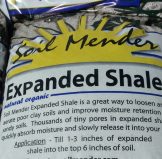 Expanded Shale: a shale product that is mined and fired near Boulder to create a light-weight, porous “gravel” that holds both water and air, and creates optimal housing for microorganisms. Aids water penetration and aeration in tight clay soils (a Real ‘clay buster’).
Expanded Shale: a shale product that is mined and fired near Boulder to create a light-weight, porous “gravel” that holds both water and air, and creates optimal housing for microorganisms. Aids water penetration and aeration in tight clay soils (a Real ‘clay buster’).
OTHER SOIL PRODUCTS
Raised Bed Soil Mix
Azomite: 70 minerals from volcanic source, to increase health, crop yields, root development; support immune function, resistance to diseases, and overall vitality of plants; prevents deficiency problems; good for fruit trees, berry bushes
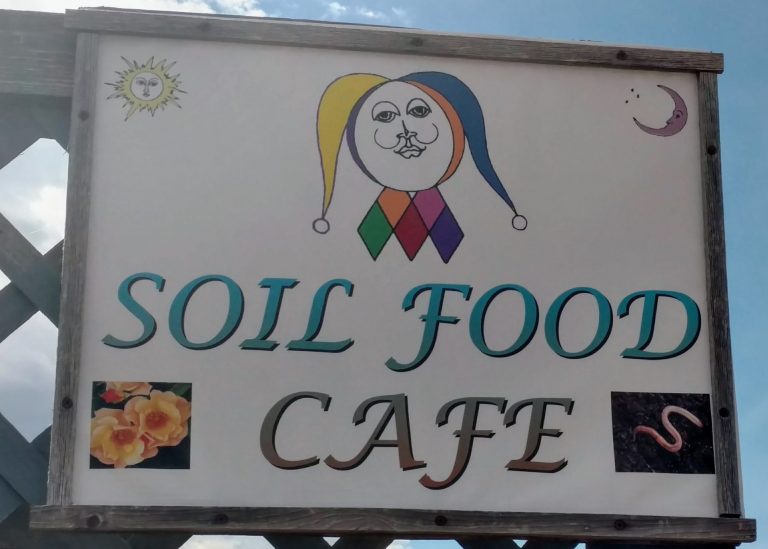
SOIL-RELATED CLASSES – Learn from Harlequin’s expert educators on topics including: building soil micro-biome, composting, soil selections for Front Range gardening, and much more. Sign up early to ensure your seat — our classes fill up fast!
What You Need to Know about Front Range Soil, by Mikl Brawner
Nobody would want to spend their winter weekends pouring over soil catalogues. To humans, soil just isn’t sexy. To plants, on the other hand, soil is very intimate, and as we humans know, intimacy can be wonderful or awful. So even though we don’t have any sexy soil pictures for you, we’d like to seduce you into looking under the covers where your plants roots are sleeping, because this is where the action will be getting warmer in a little over a month.
By now, most of us know that plants get aroused by soil, not dirt. We used to think soil was just physical; stuff to hold the plant up, so we could add a strong chemical fertilizer to make that plant, or grass, grow Fast! But we’re smarter now, because we know that soil is also biological—full of fungi, bacteria, and if it’s healthy, hundreds or even thousands of different organisms—all living and dying in a mutually supportive relationship with the plants. The plants share their carbon nutrients from photo-synthesis, and the soil life shares water, phosphorus and other riches with the plants. This is symbiosis—and symbiosis is sexy, because it supports Life.
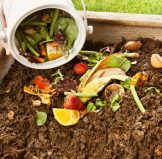 So even though there is nothing you can do at the moment, very soon, before it’s warm enough to plant, you can start making your bed sexy. Sexy soil sprouts seeds, grows roots and leaves, builds strength, makes flowers and fruit, and defends against pests.
So even though there is nothing you can do at the moment, very soon, before it’s warm enough to plant, you can start making your bed sexy. Sexy soil sprouts seeds, grows roots and leaves, builds strength, makes flowers and fruit, and defends against pests.
Why bother digging and amending? Why not just plant natives and other tough plants and skip the work? You can….some plants will do OK without much help. But Colorado soils are not Iowa soils. Colorado soils are characteristically deficient in nitrogen and organic matter, and mixing certain amendments with our tight clay allows oxygen and water to penetrate. Oxygen and water are essential to support healthy soil bacteria and other soil organisms. They encourage growth and support plant health.
So how can we support the soil life? Think how Nature does it: tree leaves fall to the earth, dead stems and leaves fall over and after years of snow and decay, a rich layer forms that feeds the soil. We humans are looking for faster results, so we can add already matured compost, healthy animal manures or organic fertilizers and rock minerals, plus, if the clay is very tight, we can add expanded shale. Too much of anything is not a good thing: add 20%-30% compost to new plantings, half the recommended organic fertilizers, a handful of rock minerals, scattered, and no more than 10%-20% expanded shale.
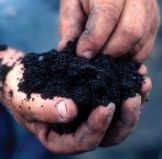 Let the biology do a lot of the work. It’s not hard to add more later; it’s very hard to correct too much. Keep the soil covered with mulch or living plants. Even native plants appreciate some compost to hold moisture and provide a light feeding when they are young. One more thing: avoid poisonous pesticides, fungicides and herbicides, like the plague. They kill or undermine the health of your allies—the soil life. Toxic pesticides are the opposite of sexy; they are like inviting the Grim Reaper into the bedroom. There are effective, non-toxic alternatives.
Let the biology do a lot of the work. It’s not hard to add more later; it’s very hard to correct too much. Keep the soil covered with mulch or living plants. Even native plants appreciate some compost to hold moisture and provide a light feeding when they are young. One more thing: avoid poisonous pesticides, fungicides and herbicides, like the plague. They kill or undermine the health of your allies—the soil life. Toxic pesticides are the opposite of sexy; they are like inviting the Grim Reaper into the bedroom. There are effective, non-toxic alternatives.
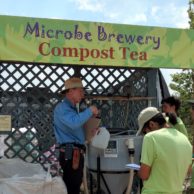 What about no-till? Not turning the soil makes sense once you’ve got the soil life in a good environment. Then you don’t want to disturb the symbiotic networks. Then you can feed from the surface; good tilth and worms will take the food down.
What about no-till? Not turning the soil makes sense once you’ve got the soil life in a good environment. Then you don’t want to disturb the symbiotic networks. Then you can feed from the surface; good tilth and worms will take the food down.
Harlequin’s Gardens has been guiding gardeners with soil care for many years. We source our materials mostly from local suppliers, and we’re very picky: we don’t sell feedlot manure or bio-comp with human wastes, or composts that are too hot or too raw. We don’t sell chemical fertilizers because they burn the soil life, disrupt the plant-soil relationship, limit plant nutrition and contribute to global warming. Our potting mixes are expensive because they nourish plants without chemical fertilizers. Sexy soils support the health of the plants and the health of the gardener who grows and eats those plants.

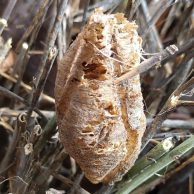
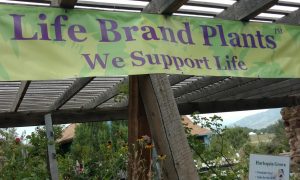 This morning’s broadcast of
This morning’s broadcast of 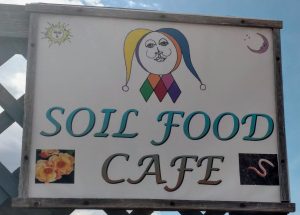
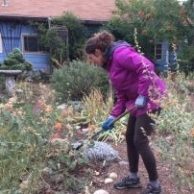 It’s the time of year to ready our gardens for the upcoming fallow winter season and prepare for next year’s growth. We do this knowing that regeneration will be occurring in our soil, with the microbes and with overwintering insects. Here are tips for you to best help this process take place, while still having an aesthetically pleasing garden.
It’s the time of year to ready our gardens for the upcoming fallow winter season and prepare for next year’s growth. We do this knowing that regeneration will be occurring in our soil, with the microbes and with overwintering insects. Here are tips for you to best help this process take place, while still having an aesthetically pleasing garden. 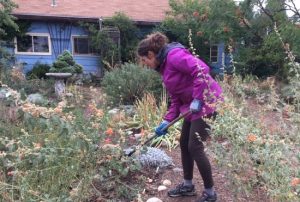
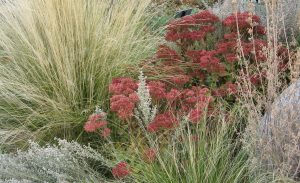
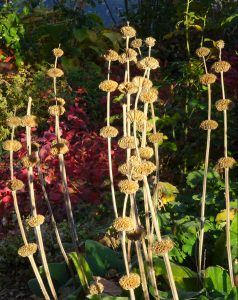
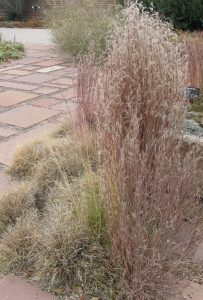 Unless you have an ‘ornamental’ grass that self-sows aggressively, leave grasses and their seedheads standing. If they are ‘cool-season’ grasses, you’ll want to leave them until about mid-February, then cut them to 3” above the ground so they can begin making unimpeded new growth as soon as the soil thaws. Dormant ‘warm-season’ grasses can remain attractive until warm weather comes and don’t need to be cut down until April.
Unless you have an ‘ornamental’ grass that self-sows aggressively, leave grasses and their seedheads standing. If they are ‘cool-season’ grasses, you’ll want to leave them until about mid-February, then cut them to 3” above the ground so they can begin making unimpeded new growth as soon as the soil thaws. Dormant ‘warm-season’ grasses can remain attractive until warm weather comes and don’t need to be cut down until April.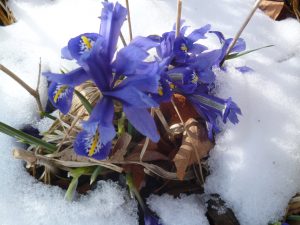
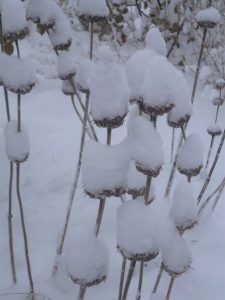
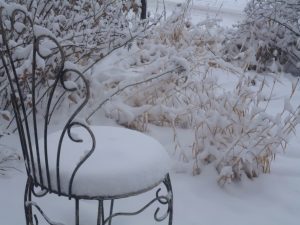
 We are having a real revolution in our relationship with our soils. The turning point is our change in focus from soil fertility to soil health. In the last 60 years of the “Green Revolution” (i.e. the petrochemical boom), soil was viewed as a physical structure and fertility was viewed as a measure of chemicals in the soil — primarily NPK, nitrogen, phosphorus and potassium. The petroleum industry could make these macronutrients from natural gas, which make plants grow but often in poor health. Weak plants attract insect pests and fungal diseases, so more petroleum in the forms of insecticides and fungicides added to the success of the oil industry. But this approach has led to “Peak Soil” where land is losing productivity, crops are losing nutritional value, the soil is eroding at extreme rates, and the health of animals and people has declined.
We are having a real revolution in our relationship with our soils. The turning point is our change in focus from soil fertility to soil health. In the last 60 years of the “Green Revolution” (i.e. the petrochemical boom), soil was viewed as a physical structure and fertility was viewed as a measure of chemicals in the soil — primarily NPK, nitrogen, phosphorus and potassium. The petroleum industry could make these macronutrients from natural gas, which make plants grow but often in poor health. Weak plants attract insect pests and fungal diseases, so more petroleum in the forms of insecticides and fungicides added to the success of the oil industry. But this approach has led to “Peak Soil” where land is losing productivity, crops are losing nutritional value, the soil is eroding at extreme rates, and the health of animals and people has declined.